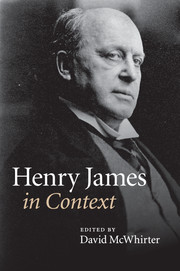Book contents
- Frontmatter
- Contents
- List of Illustrations
- Notes on Contributors
- Preface
- Abbreviations
- Chronology
- Part One Life and career, times and places
- Chapter 1 Nineteenth-century America (1843–1870)
- Chapter 2 Nineteenth-century Europe (1843–1900)
- Chapter 3 Victorian England (1870–1890)
- Chapter 4 Fin-de-siècle London (1890–1900)
- Chapter 5 The twentieth-century world (1901–1916)
- Chapter 6 Autobiographies and biographies
- Chapter 7 Letters and notebooks
- Chapter 8 The James family
- Part Two Historical and cultural contexts
- Part Three Reception
- Further reading
- Index
- References
Chapter 2 - Nineteenth-century Europe (1843–1900)
Published online by Cambridge University Press: 05 August 2014
- Frontmatter
- Contents
- List of Illustrations
- Notes on Contributors
- Preface
- Abbreviations
- Chronology
- Part One Life and career, times and places
- Chapter 1 Nineteenth-century America (1843–1870)
- Chapter 2 Nineteenth-century Europe (1843–1900)
- Chapter 3 Victorian England (1870–1890)
- Chapter 4 Fin-de-siècle London (1890–1900)
- Chapter 5 The twentieth-century world (1901–1916)
- Chapter 6 Autobiographies and biographies
- Chapter 7 Letters and notebooks
- Chapter 8 The James family
- Part Two Historical and cultural contexts
- Part Three Reception
- Further reading
- Index
- References
Summary
In November 1875 a 32-year-old Henry James rented an apartment in Paris, the city where he thought he might like to live permanently, though, at the end of a year, he moved to London. In London, or later in a country house in Rye on the Sussex coast, he made his home, and in London he died in 1916 after forty years of a life spent mostly in England. Though he often crossed the Channel to France or Italy, there were only a very few returns to his native land. Such expatriation was, in his day, remarkable. It was the time of what James called ‘the general transfusion’ (CS-5, 258) that had begun with the emerging of a new monied class, which could be observed aboard the steamships and rail network replacing the transatlantic sailing vessels and the horse-drawn diligences that served earlier travellers. But after their tours were over, few failed to return home with trunkloads of dresses from Worth’s and, in the ship’s hold, copies of famous old paintings or casts of antique sculpture. Coming back was as important as going.
James’s own family was notably itinerant. He and his three brothers and sister had been accustomed ‘hotel children’, taken along by their parents on a succession of overseas trips, educated by short-term foreign English tutors or governesses and trials of foreign schools. When James was 13 years old there were two years in Paris and the channel port of Boulogne-sur-Mer, then home and away one more time until the brink of the Civil War, when they went home to stay. Nine years would pass before James saw Europe again. He had begun to forecast a role for himself in the service of American culture as he wrote his first tales and book reviews, and expressed an ambition to do for ‘English [and American] letters and writers something of what Ste. Beuve & the best French critics have done for theirs’ while remaining in his native land, letting ‘all the breezes of the west blow through [him] at their will’ (CL 1855–1872–1, 178–9).
- Type
- Chapter
- Information
- Henry James in Context , pp. 14 - 25Publisher: Cambridge University PressPrint publication year: 2010



